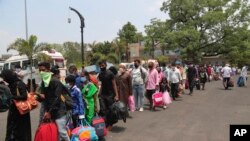More states opened up and crowds of commuters trickled onto the roads in many of India's cities on Monday as a three-phase plan to lift the nationwide coronavirus lockdown began despite an upward trend in new infections.
Businesses and shops reopened in many states and the railways announced 200 more special passenger trains. Some states also opened their borders, allowing vehicular traffic.
The coastal state of Maharashtra, home to the financial hub of Mumbai and Bollywood, allowed the resumption of film production with some restrictions in place. In New Delhi, the capital, authorities announced the reopening of all industries and salons, while keeping the borders sealed until June 8 to try to prevent a spike in new virus cases.
Although social distancing and the wearing of masks in public are still mandatory across India, some people were seen forgoing both in many places. Others violated lockdown rules. In Prayagraj, a city in northern India's Uttar Pradesh state, hundreds of Hindu devotees took a dip in the sacred Ganges river even though congregations at religious venues remain barred.
But as India eases more restrictions, it continues to report a rise in infections.
India on Monday climbed to the seventh spot in countries worst hit by the virus, passing Germany and France, as its confirmed cases rose to more than 190,000, including over 5,400 deaths.
The first phase of the easing of the lockdown, called Unlock 1, will restrict curbs to containment zones — areas that have been isolated due to coronavirus outbreaks. It gives states more power to decide and strategize lockdown implementations locally.
More than 60% of the country's virus fatalities have been reported in only two states — Maharashtra and neighboring Gujarat. The new cases are largely concentrated in six states, including New Delhi.
Critics fear that the lockdown, which started over two months ago, is being eased too soon. There are concerns that the virus may be spreading through India's villages as millions of jobless migrant workers return home from big cities.
Experts warn that the pandemic has yet to peak in India, and many states have begun to identify more high-risk zones where coronavirus lockdowns will continue until June 30. But restaurants, malls and religious venues are permitted to reopen elsewhere on June 8.
In a radio address to the nation on Sunday, Prime Minister Narendra Modi cautioned citizens and asked them to remain vigilant.
"Becoming careless or lackadaisical cannot be an option," he said. Modi's government has stressed that restrictions are being eased to focus on promoting economic activity, which has been severely hit by the lockdown.
India implemented the lockdown — one of the world's strictest — on March 25, ordering everyone to stay inside, except for emergencies and essential services, leading to a sudden halt to the economy. The lockdown was brutally devastating for daily laborers and migrant workers, who fled cities on foot for their family homes in the countryside.
The country's unemployment rate rose to 23.48% in May, according to official data released Monday.




